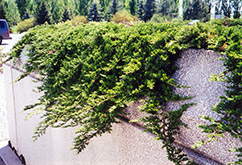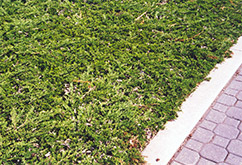Plant Library
Prince of Wales Juniper
Juniperus horizontalis 'Prince of Wales'
Height: 8 inches
Spread: 7 feet
Sunlight:
![]()
![]()
Hardiness Zone: 2a
Description:
A popular and highly rated groundcover evergreen for northern landscapes, featuring bright green foliage which turns purplish in winter, attractive ground-hugging habit, wide spreading; extremely adaptable and hardy; excellent for trailing over walls
Ornamental Features
Prince of Wales Juniper is a dwarf conifer which is primarily valued in the garden for its broadly spreading habit of growth. It has attractive emerald green evergreen foliage. The scale-like sprays of foliage are highly ornamental and turn plum purple in the fall, which persists throughout the winter.
Landscape Attributes
Prince of Wales Juniper is a dense multi-stemmed evergreen shrub with a ground-hugging habit of growth. It lends an extremely fine and delicate texture to the landscape composition which should be used to full effect.
This is a relatively low maintenance shrub, and is best pruned in late winter once the threat of extreme cold has passed. Deer don't particularly care for this plant and will usually leave it alone in favor of tastier treats. It has no significant negative characteristics.
Prince of Wales Juniper is recommended for the following landscape applications;
- Mass Planting
- Rock/Alpine Gardens
- Border Edging
- General Garden Use
- Groundcover
Planting & Growing
Prince of Wales Juniper will grow to be about 8 inches tall at maturity, with a spread of 7 feet. It tends to fill out right to the ground and therefore doesn't necessarily require facer plants in front. It grows at a slow rate, and under ideal conditions can be expected to live for approximately 30 years.
This shrub does best in full sun to partial shade. It is very adaptable to both dry and moist growing conditions, but will not tolerate any standing water. It is considered to be drought-tolerant, and thus makes an ideal choice for a low-water garden or xeriscape application. It is not particular as to soil type or pH. It is highly tolerant of urban pollution and will even thrive in inner city environments. This is a selection of a native North American species.



